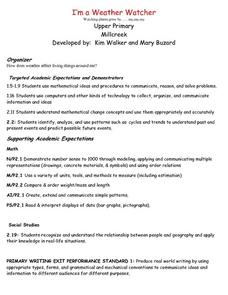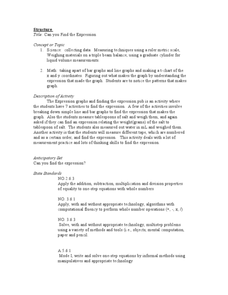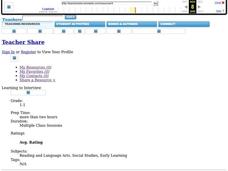Curated OER
I'm a Weather Watcher Watching plants grow by......my,my,my
Students investigate how weather affects how plants grow. They collect data on weather and plant growth for a week and display the data on a graph. For a culminating experience they design a movie using software that shows plant growth...
Curated OER
Mapping Possible Solutions
Fourth graders propose possible sites for the heart of Florida state capital by mapping collected data onto a Florida state map and recording data in a Travel Log.
Curated OER
Water Regulation
Students use their basic knowledge of physiology to analyze graphical data of paramecia under diverse conditions. From the data analysis, Students develop explanations of the animal's response to the concentration of different solutions...
Curated OER
Hopper Hunt: IPM Decision-making in Alfalfa
Learners describe migrations and life cycle pattersn of a key alfalfa pest, the Porato Leafhopper. They define the Economic Inquiry Level and Economic Threshold. Students evaluate data in relation to profit as it applies to IPM. They...
Curated OER
Water - Planning for the Future
Students explore and examine the increases and/or decreases for water user groups: irrigation, municipal, manufacturing, steam electric power generation cooling, livestock, and mining. They utilize percentage changes during their...
Curated OER
Graphs Galore
Fourth graders conduct surveys to collect data. They analyze and interpret the data, then determine which type of graph is appropriate for the data. Students use the data to make predictions, discover patterns and draw conclusions...
Curated OER
Creation Mythology
Students construct a map from geographic data and explain relationships found in the information. Students identify ancient beliefs and customs through Hawaiian creation myths while comparing similarities and differences and appreciating...
Curated OER
Can you Find the Expression
Students collect data from measurements and weights for this experiment. In this algebra lesson, students analyze graphs they create form their data to find the expression representing the data. They label which graph provided the best...
Curated OER
Using Charts and Graphs to Study East Asia's Modern Economy
Students examine East Asia's modern economy. In groups, classmates use the internet to compare the resources, products, and economy of specified countries. After collecting the data, pupils create charts, tables and graphs. They...
Curated OER
Boxplots Introduction
Students describe the pattern of a bell curve graph. In this statistics lesson, students move data around and make observation about the mean, and the quartiles. They define boxplot, outlier, range and other important vocabulary words...
Curated OER
Investigate Science Using Crayfish
Young scientists discover the importance of scientific investigation by observing live crayfish. They carefully observe the patterns of crayfish in different environments. Then they discuss their conclusions and define what all living...
Curated OER
Changing Ramp Heights
Learners conduct an experiment to determine how the change in ramp height affects the distances a ball is able to move a stationary cup. Data is collected from several trials and recorded and analyzed.
Curated OER
Family Vacation
Students use math to plan a trip by houseboat down the Mississippi River. They research and obtain information on the Mississippi River and its surroundings and use multiple graphs to represent their data.
Curated OER
Radioactive Decay Curve
Students gather and organize data. In this radioactive decay curve lesson, students gather data as they follow the provided procedures for rolling dice. Students chart their data and examine interval results.
Curated OER
How Do They Relate? Linear Relationship
Students collect information and use a line to represent it. In this algebra lesson, students investigate real world data to see if it makes a line. They graph the line comparing the relationship of the x axis with that of the y axis.
Curated OER
Identifying Creatures
Young scholars use a classification key from a provided worksheet to identify creatures. This task assesses student's abilities to interpret data, make decisions, identify, and classify.
Curated OER
Learning to Interview
An authentic and engaging way to practice literacy skills, this lesson calls for young language arts pupils to conduct interviews with classmates and family members. First, pupils watch as the teacher models the interview process with a...
Curated OER
Exploring the MapleCopter
Study explore the motion of maple seeds and design experiments to explain their spinning flight patterns. They make observations, explain ideas of motion, use models, analyze previous reports and experiments, identify relevant factors...
Curated OER
Virtual Field Trip: Lodging and Meals
Students calculate the costs for lodging and meals for a virtual field trip. They calculate the number of nights lodging needed for road and city travel and the number of meals needed, the costs for each, and input the data using...
Curated OER
Will There be Enough Water?
Students investigate water usage, water available, and water demand historically in the local area. They use projections of water usage, availability and demand up to the year 2050. Students use graphs to relate as well as compare and...
Curated OER
T-Shirt Glyph
Students create a glyph (a symbol or icon) that represents who they are, and read the glyphs of others to explain the glyphs' data.
Curated OER
1st Grade - Act. 03: T-Shirt Glyph
First graders create glyphs (symbols or icons) which represents them, and read the glyphs of others using a legend to explain the data on the glyphs.
Curated OER
Clouds and the Weather
Fourth graders analyze the relationship of clouds and local weather. Students also observe and record cloud data and weather conditions daily as they research different cloud types. The data is analyzed looking for trends in daily...
Curated OER
Colored Drops
Students examine the properties of a liquid that contains water and food coloring and a liquid that contains water, food coloring and a liquid detergent. They interpret their data, describe properties, and make reasonable explanations...

























